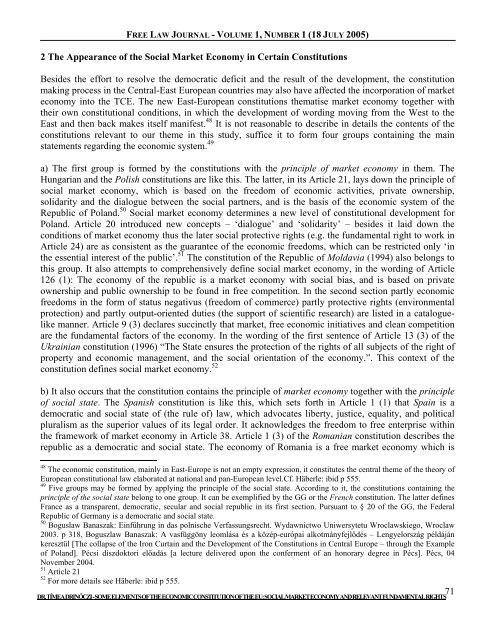Free_Law_Journal-Vol.. - Free World Publishing Inc.
Free_Law_Journal-Vol.. - Free World Publishing Inc.
Free_Law_Journal-Vol.. - Free World Publishing Inc.
You also want an ePaper? Increase the reach of your titles
YUMPU automatically turns print PDFs into web optimized ePapers that Google loves.
FREE LAW JOURNAL - VOLUME 1, NUMBER 1 (18 JULY 2005)<br />
2 The Appearance of the Social Market Economy in Certain Constitutions<br />
Besides the effort to resolve the democratic deficit and the result of the development, the constitution<br />
making process in the Central-East European countries may also have affected the incorporation of market<br />
economy into the TCE. The new East-European constitutions thematise market economy together with<br />
their own constitutional conditions, in which the development of wording moving from the West to the<br />
East and then back makes itself manifest. 48 It is not reasonable to describe in details the contents of the<br />
constitutions relevant to our theme in this study, suffice it to form four groups containing the main<br />
statements regarding the economic system. 49<br />
a) The first group is formed by the constitutions with the principle of market economy in them. The<br />
Hungarian and the Polish constitutions are like this. The latter, in its Article 21, lays down the principle of<br />
social market economy, which is based on the freedom of economic activities, private ownership,<br />
solidarity and the dialogue between the social partners, and is the basis of the economic system of the<br />
Republic of Poland. 50 Social market economy determines a new level of constitutional development for<br />
Poland. Article 20 introduced new concepts – ‘dialogue’ and ‘solidarity’ – besides it laid down the<br />
conditions of market economy thus the later social protective rights (e.g. the fundamental right to work in<br />
Article 24) are as consistent as the guarantee of the economic freedoms, which can be restricted only ‘in<br />
the essential interest of the public’. 51 The constitution of the Republic of Moldavia (1994) also belongs to<br />
this group. It also attempts to comprehensively define social market economy, in the wording of Article<br />
126 (1): The economy of the republic is a market economy with social bias, and is based on private<br />
ownership and public ownership to be found in free competition. In the second section partly economic<br />
freedoms in the form of status negativus (freedom of commerce) partly protective rights (environmental<br />
protection) and partly output-oriented duties (the support of scientific research) are listed in a cataloguelike<br />
manner. Article 9 (3) declares succinctly that market, free economic initiatives and clean competition<br />
are the fundamental factors of the economy. In the wording of the first sentence of Article 13 (3) of the<br />
Ukrainian constitution (1996) “The State ensures the protection of the rights of all subjects of the right of<br />
property and economic management, and the social orientation of the economy.”. This context of the<br />
constitution defines social market economy. 52<br />
b) It also occurs that the constitution contains the principle of market economy together with the principle<br />
of social state. The Spanish constitution is like this, which sets forth in Article 1 (1) that Spain is a<br />
democratic and social state of (the rule of) law, which advocates liberty, justice, equality, and political<br />
pluralism as the superior values of its legal order. It acknowledges the freedom to free enterprise within<br />
the framework of market economy in Article 38. Article 1 (3) of the Romanian constitution describes the<br />
republic as a democratic and social state. The economy of Romania is a free market economy which is<br />
48 The economic constitution, mainly in East-Europe is not an empty expression, it constitutes the central theme of the theory of<br />
European constitutional law elaborated at national and pan-European level.Cf. Häberle: ibid p 555.<br />
49 Five groups may be formed by applying the principle of the social state. According to it, the constitutions containing the<br />
principle of the social state belong to one group. It can be exemplified by the GG or the French constitution. The latter defines<br />
France as a transparent, democratic, secular and social republic in its first section. Pursuant to § 20 of the GG, the Federal<br />
Republic of Germany is a democratic and social state.<br />
50 Boguslaw Banaszak: Einführung in das polnische Verfassungsrecht. Wydawnictwo Uniwersytetu Wroclawskiego, Wroclaw<br />
2003. p 318, Boguszlaw Banaszak: A vasfüggöny leomlása és a közép-európai alkotmányfejlődés – Lengyelország példáján<br />
keresztül [The collapse of the Iron Curtain and the Development of the Constitutions in Central Europe – through the Example<br />
of Poland]. Pécsi díszdoktori előadás [a lecture delivered upon the conferment of an honorary degree in Pécs]. Pécs, 04<br />
November 2004.<br />
51 Article 21<br />
52 For more details see Häberle: ibid p 555.<br />
DR. TÍMEA DRINÓCZI - SOME ELEMENTS OF THE ECONOMIC CONSTITUTION OF THE EU: SOCIAL MARKET ECONOMY AND RELEVANT FUNDAMENTAL RIGHTS 71
















